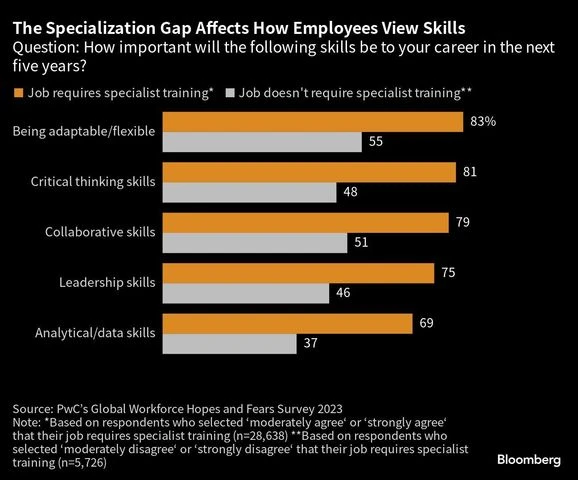By Mia Gindis
Quit rates dropped to 2019 levels in April after the mass turnover of the Great Resignation, but PwC data shows that the desire to quit has shifted to a different end of the corporate hierarchy — unspecialised workers.
)
This group is feeling the weight of financial pressures brought on by inflation rates and an unstable economy, with the proportion of workers who say they have money left over at the end of the month declining to 38% this year, from 47% in 2022. Nearly one in five respondents reported taking on a second job to supplement their income, oftentimes out of necessity rather than the desire to learn new skills.
“I was really surprised that so many people had a side-hustle,” said Bhushan Sethi, partner within Strategy&, PwC’s strategy consulting business. Though struggling workers were represented across most demographic categories, the economic burden was the “most pressing for minorities,” he said.
Unsatisfied office workers planning to leave their jobs in the next year will likely compete with artificial intelligence in the search for another role, making it critical to learn new skills now.
Workers coping with financial stress in the present are also slated to be the losers of the AI and automation waves in the near future. Only 15% of employees with no specialized training agreed that the nature of their role will change significantly in the next five years, compared to more than half (51%) of workers with specialized skills. This disparity only widens the specialization gap by discouraging prospective jobseekers from acquiring skills that’ll allow them to remain effective in their roles or to land new ones.
Company leaders should also prepare themselves and their workforce for the future. A third of employees feel their company won’t be economically viable in ten years on the current course — consistent with the 39% of CEOs who responded similarly earlier this year to PwC’s Global CEO Survey. Leaders must reorganize to uplift their employees, either by increasing wages or providing training to strengthen skills that AI can’t replicate.
“If we have two sets of workers who are having totally different experiences in a company, leaders must ensure they bring everyone along and explain how they give opportunities to all,” said Sethi.
Note:- (Not all news on the site expresses the point of view of the site, but we transmit this news automatically and translate it through programmatic technology on the site and not from a human editor. The content is auto-generated from a syndicated feed.))


